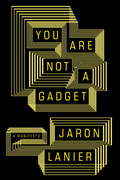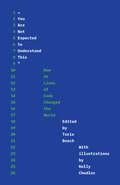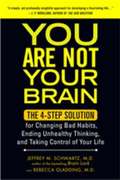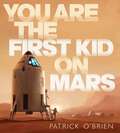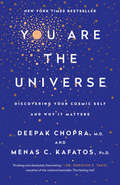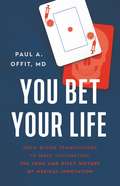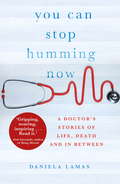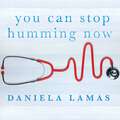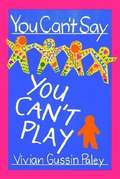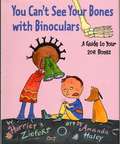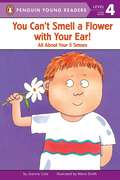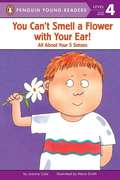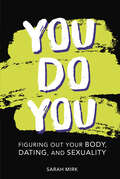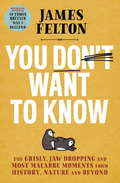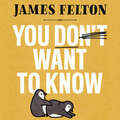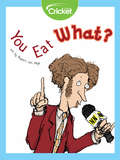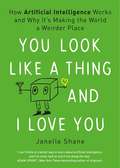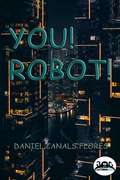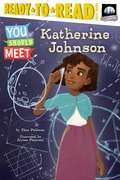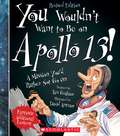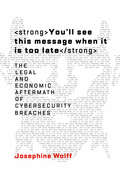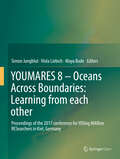- Table View
- List View
You Are Not a Gadget: A Manifesto
by Jaron Lanier'Jaron Lanier's long-awaited book is fabulous - I couldn't put it down and shouted out Yes! Yes! on many pages. Lanier is a rare voice of sanity in the debate about the relationship between computers and we human beings. He convincingly shows us that the idea of digital computers having human-like intelligence is a fantasy - computers are tools and toys and, like musical instruments, are created by us to enhance our humanity. But when they are badly designed they diminish our individuality, freedom and humanity. This is a landmark book that will have people talking and arguing for years into the future' Lee SmolinSomething went wrong around the start of the twenty-first century. Individual creativity began to go out of fashion. Music became an endless rehashing of the past. Scientists were in danger of no longer understanding their own research. Indeed, not only was individual creativity old-fashioned but so were individuals themselves. The crowd was wise. Machines, specifically computers, were no longer tools to be used by human minds - they were better than humans. Welcome to the world of the digital revolution. Yet what if, despite web 2. 0, despite OpenSource, despite the wisdom of crowds, and the creation of Wikipedia, only people are meaningful? After all, when the printing press was invented, the mechanism was ultimately less impressive than the authors. What if, by devaluing individuals, we are deadening creativity, endlessly rehashing past culture, risking weaker design in engineering and science, losing democracy, and reducing development - in every sphere?In You Are Not a Gadget, Jaron Lanier, digital guru and pioneer of Virtual Reality, delivers a searing manifesto in support of the human and reflects on the good and bad developments in design and thought twenty years after the invention of the web. Controversial and fascinating, You Are Not a Gadget is a deeply felt defence of the individual from an author uniquely qualified to comment on the way technology interacts with our culture.
"You Are Not Expected to Understand This": How 26 Lines of Code Changed the World
by Kelly ChudlerLeading technologists, historians, and journalists reveal the stories behind the computer coding that touches all aspects of life—for better or worseFew of us give much thought to computer code or how it comes to be. The very word “code” makes it sound immutable or even inevitable. “You Are Not Expected to Understand This” demonstrates that, far from being preordained, computer code is the result of very human decisions, ones we all live with when we use social media, take photos, drive our cars, and engage in a host of other activities.Everything from law enforcement to space exploration relies on code written by people who, at the time, made choices and assumptions that would have long-lasting, profound implications for society. Torie Bosch brings together many of today’s leading technology experts to provide new perspectives on the code that shapes our lives. Contributors discuss a host of topics, such as how university databases were programmed long ago to accept only two genders, what the person who programmed the very first pop-up ad was thinking at the time, the first computer worm, the Bitcoin white paper, and perhaps the most famous seven words in Unix history: “You are not expected to understand this.”This compelling book tells the human stories behind programming, enabling those of us who don’t think much about code to recognize its importance, and those who work with it every day to better understand the long-term effects of the decisions they make.With an introduction by Ellen Ullman and contributions by Mahsa Alimardani, Elena Botella, Meredith Broussard, David Cassel, Arthur Daemmrich, Charles Duan, Quinn DuPont, Claire L. Evans, Hany Farid, James Grimmelmann, Katie Hafner, Susan C. Herring, Syeda Gulshan Ferdous Jana, Lowen Liu, John MacCormick, Brian McCullough, Charlton McIlwain, Lily Hay Newman, Margaret O’Mara, Will Oremus, Nick Partridge, Benjamin Pope, Joy Lisi Rankin, Afsaneh Rigot, Ellen R. Stofan, Lee Vinsel, Josephine Wolff, and Ethan Zuckerman.
You Are Not Your Brain
by Rebecca Gladding Jeffrey SchwartzTwo neuroscience experts explain how their 4-Step Method can help break destructive thoughts and actions and change bad habits for good. A leading neuroplasticity researcher and the coauthor of the groundbreaking books Brain Lock and The Mind and the Brain, Jeffrey M. Schwartz has spent his career studying the structure and neuronal firing patterns of the human brain. He pioneered the first mindfulness-based treatment program for people suffering from OCD, teaching patients how to achieve long-term relief from their compulsions. For the past six years, Schwartz has worked with psychiatrist Rebecca Gladding to refine a program that successfully explains how the brain works and why we often feel besieged by bad brain wiring. Just like with the compulsions of OCD patients, they discovered that bad habits, social anxieties, self-deprecating thoughts, and compulsive overindulgence are all rooted in overactive brain circuits. The key to making life changes that you want-to make your brain work for you-is to consciously choose to "starve" these circuits of focused attention, thereby decreasing their influence and strength. As evidenced by the huge success of Schwartz's previous books, as well as Daniel Amen's Change Your Brain, Change Your Life, and Norman Doidge's The Brain That Changes Itself, there is a large audience interested in harnessing the brain's untapped potential, yearning for a step-by-step, scientifically grounded and clinically proven approach. In fact, readers of Brain Lock wrote to the authors in record numbers asking for such a book. In You Are Not Your Brain, Schwartz and Gladding carefully outline their program, showing readers how to identify negative brain impulses, channel them through the power of focused attention, and ultimately lead more fulfilling and empowered lives.
You Are Not Your Brain
by Jeffrey Schwartz Rebecca GladdingTwo neuroscience experts explain how their 4-Step Method can help identify negative thoughts and change bad habits for good. A leading neuroplasticity researcher and the coauthor of the groundbreaking books Brain Lock and The Mind and the Brain, Jeffrey M. Schwartz has spent his career studying the human brain. He pioneered the first mindfulness-based treatment program for people suffering from OCD, teaching patients how to achieve long-term relief from their compulsions.Schwartz works with psychiatrist Rebecca Gladding to refine a program that successfully explains how the brain works and why we often feel besieged by overactive brain circuits (i.e. bad habits, social anxieties, etc.) the key to making life changes that you want--to make your brain work for you--is to consciously choose to "starve" these circuits of focused attention, thereby decreasing their influence and strength.You Are Not Your Brain carefully outlines their program, showing readers how to identify negative impulses, channel them through the power of focused attention, and ultimately lead more fulfilling and empowered lives.
You Are the First Kid on Mars
by Patrick O'BrienAs we look back to the beginnings of the space race, 2009 is also the year for looking forward to humankind?s next step toward the stars. In the spirit of books that once imagined colonies on the moon, Patrick O?Brien has created a unique look at your first trip to Mars. Using the most upto- date designs and theories of what it will take to establish a base on Mars, you are off on an incredible journey, over 35 million miles to the red planet. Filled with details, and vividly brought to life, this is an adventure that you are never going to forget.
You Are the Universe: Discovering Your Cosmic Self and Why It Matters
by Deepak Chopra Menas C. Kafatos<P>New York Times bestselling author Deepak Chopra joins forces with leading physicist Menas Kafatos to explore some of the most important and baffling questions about our place in the world. <P> What happens when modern science reaches a crucial turning point that challenges everything we know about reality? In this brilliant, timely, and practical work, Chopra and Kafatos tell us that we've reached just such a point. In the coming era, the universe will be completely redefined as a "human universe" radically unlike the cold, empty void where human life is barely a speck in the cosmos. <P>You Are the Universe literally means what it says--each of us is a co-creator of reality extending to the vastest reaches of time and space. This seemingly impossible proposition follows from the current state of science, where outside the public eye, some key mysteries cannot be solved, even though they are the very issues that define reality itself: What Came Before the Big Bang? Why Does the Universe Fit Together So Perfectly? Where Did Time Come From? What Is the Universe Made Of? Is the Quantum World Linked to Everyday Life? Do We Live in a Conscious Universe? How Did Life First Begin? <P> “The shift into a new paradigm is happening,” the authors write. “The answers offered in this book are not our invention or eccentric flights of fancy. All of us live in a participatory universe. Once you decide that you want to participate fully with mind, body, and soul, the paradigm shift becomes personal. The reality you inhabit will be yours either to embrace or to change.” What these two great minds offer is a bold, new understanding of who we are and how we can transform the world for the better while reaching our greatest potential. <P><b>A New York Times Bestseller</b>
You Bet Your Life: From Blood Transfusions to Mass Vaccination, the Long and Risky History of Medical Innovation
by Paul A OffitOne of America&’s top physicians traces the history of risk in medicine—with powerful lessons for today Every medical decision—whether to have chemotherapy, an X-ray, or surgery—is a risk, no matter which way you choose. In You Bet Your Life, physician Paul A. Offit argues that, from the first blood transfusions four hundred years ago to the hunt for a COVID-19 vaccine, risk has been essential to the discovery of new treatments. More importantly, understanding the risks is crucial to whether, as a society or as individuals, we accept them. Told in Offit&’s vigorous and rigorous style, You Bet Your Life is an entertaining history of medicine. But it also lays bare the tortured relationships between intellectual breakthroughs, political realities, and human foibles. Our pandemic year has shown us, with its debates over lockdowns, masks, and vaccines, how easy it is to get everything wrong. You Bet Your Life is an essential read for getting the future a bit more right.
You Can Stop Humming Now: A Doctor's Stories of Life, Death and in Between
by Dr. Daniela Lamas'Gripping, soaring, inspiring . . . Read it' - Atul Gawande, author of the international bestseller Being Mortal'You Can Stop Humming Now is essential reading on what it means to be human in an age of medical technology. I couldn't put it down' - Alexandria Marzano-Lesnevich, author of The Fact of a Body'In turns anguishing, gripping, and hopeful, You Can Stop Humming Now is a must-read for anyone contemplating what medicine holds in store for us.' - Danielle Ofri, MD, PhD, author of What Patients Say, What Doctors FeelModern medicine is a world that glimmers with new technology and cutting-edge research. To the public eye, medical stories often begin with sirens and flashing lights and culminate in survival or death. But these are only the most visible narratives. As a critical care doctor treating people at their sickest, Daniela Lamas is fascinated by a different story: what comes after for those whose lives are extended by days, months, or years as a result of our treatments and technologies?In You Can Stop Humming Now, Lamas explores the complex answers to this question through intimate accounts of patients and their families. A grandfather whose failing heart has been replaced by a battery-operated pump; a salesman who found himself a kidney donor on social media; a college student who survived a near fatal overdose and returned home, alive but not the same; and a young woman navigating an adulthood she never thought she'd live to see-these moving narratives paint a detailed picture of the fragile border between sickness and health.Riveting, beautifully told, and deeply personal, You Can Stop Humming Now is a compassionate, uncompromising look at the choices and realities that many of us, and our families, may one day face.
You Can Stop Humming Now: A Doctor's Stories of Life, Death and in Between
by Dr. Daniela Lamas'Gripping, soaring, inspiring . . . Read it' - Atul Gawande, author of the international bestseller Being Mortal'You Can Stop Humming Now is essential reading on what it means to be human in an age of medical technology. I couldn't put it down' - Alexandria Marzano-Lesnevich, author of The Fact of a Body'In turns anguishing, gripping, and hopeful, You Can Stop Humming Now is a must-read for anyone contemplating what medicine holds in store for us.' - Danielle Ofri, MD, PhD, author of What Patients Say, What Doctors FeelModern medicine is a world that glimmers with new technology and cutting-edge research. To the public eye, medical stories often begin with sirens and flashing lights and culminate in survival or death. But these are only the most visible narratives. As a critical care doctor treating people at their sickest, Daniela Lamas is fascinated by a different story: what comes after for those whose lives are extended by days, months, or years as a result of our treatments and technologies?In You Can Stop Humming Now, Lamas explores the complex answers to this question through intimate accounts of patients and their families. A grandfather whose failing heart has been replaced by a battery-operated pump; a salesman who found himself a kidney donor on social media; a college student who survived a near fatal overdose and returned home, alive but not the same; and a young woman navigating an adulthood she never thought she'd live to see-these moving narratives paint a detailed picture of the fragile border between sickness and health.Riveting, beautifully told, and deeply personal, You Can Stop Humming Now is a compassionate, uncompromising look at the choices and realities that many of us, and our families, may one day face.
You Can't Say You Can't Play
by Vivian Gussin PaleyWho of us cannot remember the pain and humiliation of being rejected by our classmates? However thick-skinned or immune to such assaults we may become as adults, the memory of those early exclusions is as palpable to each of us today as it is common to human experience. We remember the uncertainty of separating from our home and entering school as strangers and, more than the relief of making friends, we recall the cruel moments of our own isolation as well as those children we knew were destined to remain strangers.<P> In this book Vivian Paley employs a unique strategy to probe the moral dimensions of the classroom. She departs from her previous work by extending her analysis to children through the fifth grade, all the while weaving remarkable fairy tale into her narrative description. Paley introduces a new rule-"You can't say you can't play"-to her kindergarten classroom and solicits the opinions of older children regarding the fairness of such a rule. We hear from those who are rejected as well as those who do the rejecting. One child, objecting to the rule, says, "It will be fairer, but how are we going to have any fun?" Another child defends the principle of classroom bosses as a more benign way of excluding the unwanted.<P> In a brilliant twist, Faley mixes fantasy and reality, and introduces a new voice into the debate: Magpie, a magical bird, who brings lonely people to a place where a full share of the sun is rightfully theirs. Myth and morality begin to proclaim the same message and the schoolhouse will be the crucible in which the new order is tried. A struggle ensues and even the Magpie stories cannot avoid the scrutiny of this merciless pack of social philosophers who will not be easily caught in a morality tale.<P> You Can't Say You Can't Play speaks to some of our most deeply held beliefs. Is exclusivity part of human nature? Can we legislate fairness and still nurture creativity and individuality? Can children be freed from the habit of rejection? These are some of the questions. The answers are to be found in the words of Paley's schoolchildren and in the wisdom of their teacher who respectfully listens to them.
You Can't See Your Bones With Binoculars: A Guide To Your 206 Bones
by Harriet ZiefertText and illustrations, including x-rays, provide a guided tour of the human skeleton, encouraging the reader to find and feel each bone as it is described.
You Can't Smell a Flower with Your Ear! (Penguin Young Readers, Level 4)
by Joanna ColeLevel Four How can your tongue tell a sweet taste from a sour one? How do your ears know which way a sound is coming from? Find out in this sense-sational nonfiction book!
You Can't Smell a Flower with Your Ear! All About Your 5 Senses
by Joanna ColeHow can your tongue tell a sweet taste from a sour one? How do your ears know which way a sound is coming from? Find out in this sense-sational nonfiction book!
You Do You: Figuring Out Your Body, Dating, and Sexuality
by Sarah MirkTeen sex. STIs. Sexting. Rape. Sexual harassment. #MeToo and #YesAllWomen. Today's teens launch into their sexual lives facing challenging issues but with little if any formalized learning about sex and human reproduction. Many of them get their sex ed from online porn. Through this authoritative, inclusive, and teen-friendly overview, readers learn the basics about sex, sexuality, human reproduction and development, birth control, gender identity, healthy communication, dating, relationships and break ups, the importance of consent, safety, body positivity and healthy lifestyles, media myths, and more. Advice-column-style Q&As and real-life stories add human drama and authenticity.
You Don't Want to Know: The grisly, jaw-dropping and most macabre moments from history, nature and beyond
by James FeltonWith his trademark brand of bulldozer-banter, Twitter legend James Felton guides you through the most morbidly fascinating facts you'll then wish you could forget. Ever wondered why the chainsaw was invented?* How authorities dealt with a beached whale back in ye olde days of 1970?** Or what being a human decanter entails?*** Then you've come to the right place! Within these pages you'll find the maddest, strangest and downright grossest stories from history, nature and science that you don't want to know. (Except secretly you really do you masochistic, beastly person you.) Illustrated, painfully funny and drop-your-jaw ridiculous, this is trivia from the cesspit of time that you won't be able to stop reading once you start.*To aid childbirth.**They exploded it with 100 times too much dynamite and rained blubber down on unsuspecting people and buildings.***Decency prevents us from answering this one here. You'll have to buy the book to find out.
You Don't Want to Know: The grisly, jaw-dropping and most macabre moments from history, nature and beyond
by James FeltonWith his trademark brand of bulldozer-banter, Twitter legend James Felton guides you through the most morbidly fascinating facts you'll then wish you could forget. Ever wondered why the chainsaw was invented?* How authorities dealt with a beached whale back in ye olde days of 1970?** Or what being a human decanter entails?*** Then you've come to the right place! Within these pages you'll find the maddest, strangest and downright grossest stories from history, nature and science that you don't want to know. (Except secretly you really do you masochistic, beastly person you.) Illustrated, painfully funny and drop-your-jaw ridiculous, this is trivia from the cesspit of time that you won't be able to stop reading once you start.*To aid childbirth.**They exploded it with 100 times too much dynamite and rained blubber down on unsuspecting people and buildings.***Decency prevents us from answering this one here. You'll have to buy the book to find out.
You Don't Want to Know: The grisly, jaw-dropping and most macabre moments from history, nature and beyond
by James FeltonRead by James Buckley aka unforgettable Jay from The Inbetweeners' With his trademark brand of bulldozer-banter, Twitter legend James Felton guides you through the most morbidly fascinating facts you'll then wish you could forget. Ever wondered why the chainsaw was invented?* How authorities dealt with a beached whale back in ye olde days of 1970?** Or what being a human decanter entails?*** Then you've come to the right place! Within these pages you'll find the maddest, strangest and downright grossest stories from history, nature and science that you don't want to know. (Except secretly you really do you masochistic, beastly person you.) Illustrated, painfully funny and drop-your-jaw ridiculous, this is trivia from the cesspit of time that you won't be able to stop reading once you start.*To aid childbirth.**They exploded it with 100 times too much dynamite and rained blubber down on unsuspecting people and buildings.***Decency prevents us from answering this one here. You'll have to buy the book to find out.
You Eat What?
by Liz HuyckSome animals have pretty weird tastes in dining. Did you know that porcupines eat antlers, chickens eat rocks, and elephants eat clay? Hold onto your menus, we're going in!
You Look Like a Thing and I Love You: How Artificial Intelligence Works And Why It's Making The World A Weirder Place
by Janelle Shane'I can't think of a better way to learn about artificial intelligence, and I've never had so much fun along the way' Adam Grant, New York Times bestselling author of Originals and Option B AI is the technology of the future, but how does it actually work? A hilarious, transporting look under the hood of the technology that's changing the world - and why it's dumber than we thinkYou Look Like a Thing and I Love You is one of the best pickup lines ever . . . according to an artificial intelligence trained by scientist Janelle Shane, creator of the popular blog AI Weirdness. She makes silly AIs that learn how to name paint colors, create the best recipes, and even flirt (badly) with humans - all to understand the technology that governs so much of our human lives. We rely on AI every day for recommendations, for rust AI with matters of life and death, on the road and in our hospitals. But how smart is AI really . . . and how does it solve problems, understand humans, and drive self-driving cars?This hilarious introduction to the most interesting science of our time, shows us how these programs learn, fail, and adapt - and how they reflect both the best and the worst of humanity.
You Need Your Nose: Learning the N Sound (PowerPhonics)
by Kevin SarkisianThis book teaches facts while incorporating the fundamentals of phonemic patterns and usage
You! Robot!
by Daniel Canals FloresA Dystopic Description of the future of Humankind based on man's lack of interest in addressing climate change coupled with the obsessive desire for comfort and profit over other values. Mankind could fall into the trap of allowing machines to cater to his every need.
You should Meet: Katherine Johnson
by Thea FeldmanMeet Katherine Johnson, a brilliant mathematician who worked at NASA in the early 1950s until retiring in 1986. Katherine's unparalleled calculations (done by hand) helped plan the trajectories for NASA's Mercury and Apollo missions (including the Apollo 11 moon landing). She is said to be one of the greatest American minds of all time.
You Wouldn't Want to Be on Apollo 13!: A Mission You'd Rather Not Go On (You Wouldn't Want To... Series)
by Ian GrahamCount down to liftoff! You are about to go on the most exciting and dangerous journey of your life. You are part of the crew on the spacecraft Apollo 13. It's Amazing! Top Tips from Experts! If you need to meets, do it before your helmet is fitted! Make sure you ate tightly strapped into your seal for takeoff. Don't panic! Keep calm or you might make things worse. Don't move around too much-you'll use up more precious oxygen.
You'll See This Message When It Is Too Late: The Legal and Economic Aftermath of Cybersecurity Breaches (Information Policy)
by Josephine WolffWhat we can learn from the aftermath of cybersecurity breaches and how we can do a better job protecting online data. Cybersecurity incidents make the news with startling regularity. Each breach—the theft of 145.5 million Americans' information from Equifax, for example, or the Russian government's theft of National Security Agency documents, or the Sony Pictures data dump—makes headlines, inspires panic, instigates lawsuits, and is then forgotten. The cycle of alarm and amnesia continues with the next attack, and the one after that. In this book, cybersecurity expert Josephine Wolff argues that we shouldn't forget about these incidents, we should investigate their trajectory, from technology flaws to reparations for harm done to their impact on future security measures. We can learn valuable lessons in the aftermath of cybersecurity breaches. Wolff describes a series of significant cybersecurity incidents between 2005 and 2015, mapping the entire life cycle of each breach in order to identify opportunities for defensive intervention. She outlines three types of motives underlying these attacks—financial gain, espionage, and public humiliation of the victims—that have remained consistent through a decade of cyberattacks, offers examples of each, and analyzes the emergence of different attack patterns. The enormous TJX breach in 2006, for instance, set the pattern for a series of payment card fraud incidents that led to identity fraud and extortion; the Chinese army conducted cyberespionage campaigns directed at U.S.-based companies from 2006 to 2014, sparking debate about the distinction between economic and political espionage; and the 2014 breach of the Ashley Madison website was aimed at reputations rather than bank accounts.
YOUMARES 8 – Oceans Across Boundaries: Proceedings Of The 2017 Conference For Young Marine Researchers In Kiel, Germany
by Maya Bode Viola Liebich Simon JungblutThis open access book presents the proceedings volume of the YOUMARES 8 conference, which took place in Kiel, Germany, in September 2017, supported by the German Association for Marine Sciences (DGM). The YOUMARES conference series is entirely bottom-up organized by and for YOUng MARine RESearchers. Qualified early career scientists moderated the scientific sessions during the conference and provided literature reviews on aspects of their research field. These reviews and the presenters’ conference abstracts are compiled here. Thus, this book discusses highly topical fields of marine research and aims to act as a source of knowledge and inspiration for further reading and research.
